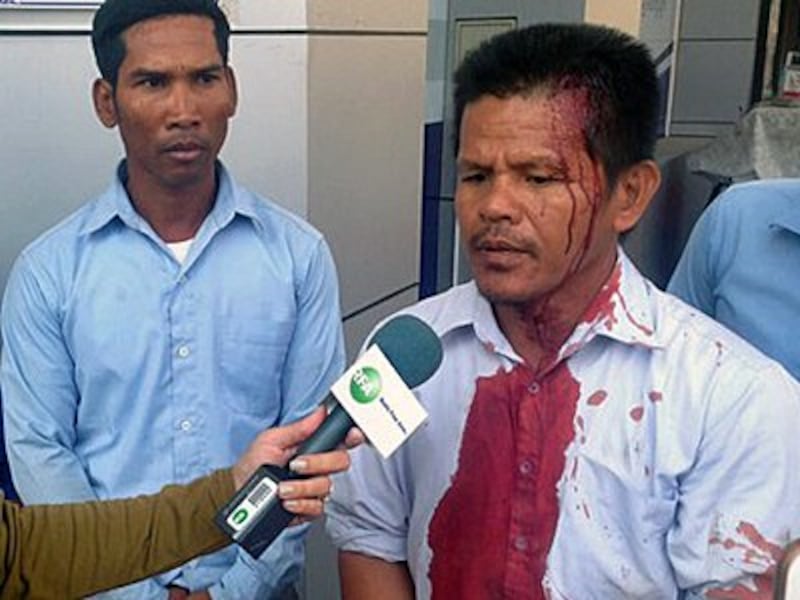The approval of a controversial law regulating trade unions by Cambodia’s lower house of parliament on Monday has prompted criticism from a regional human rights group that the legislation is a “step backwards” for workers’ rights in the Southeast Asian nation.
“The passage of a new law regulating trade unions in Cambodia represents a step backward for workers’ rights and violates international labor and human rights standards,” the ASEAN Parliamentarians for Human Rights (APHR) said in a statement Tuesday.
The Jakarta-based association of regional lawmakers has requested that the Cambodian Senate, the upper house of parliament, reject the legislation and return it to the relevant committee for further review.
Cambodian lawmakers ignored recommendations from trade unions and rights groups when considering the legislation, which fails to meet international legal standards, APHR said.
During the debate, the opposition Cambodian National Rescue Party (CNRP) opposed the legislation, but lacked the votes to stop it.
Cambodian Senate spokesman Mam Bun Neang said Wednesday that committees in the upper house would discuss the legislation before submitting it to senators for their vote.
“We will review the draft law [and] provide feedback or return it to the National Assembly if there are loopholes, he told RFA’s Khmer Service.
But sending the legislation back will not likely happen, he said.
“So far, we haven’t sent any laws back because the government and National Assembly have studied those draft laws very well,” he said. “They [members of parliament] have held many national workshops and accepted all the recommendations.”
‘Burdensome restrictions’
Cambodian Prime Minister Hun Sen has said the law will regulate the country's 3,400 trade unions, many of which represent Cambodia’s export-oriented garment industry, and offer protection to both workers and investors.
But unionists and international human rights groups warn that it will weaken the power of labor groups in a sector still rife with abuse.
Critics also oppose the law’s provisions forcing unions to report their finances to the government and increase authorities’ power to close down labor groups.
The law doesn’t allow trade unions complete freedom to protest the interests of their members, the APHR said.
“This law includes burdensome restrictions on the right of workers to organize freely and subjects unions to undue government interference,” said APHR chairman Charles Santiago.
“It appears, yet again, that ASEAN governments are prioritizing questionable policies in the supposed interest of promoting investment, while failing to protect their one people,” he said.
The vote on the trade union legislation sparked protests on Monday, resulting in two labor activists being injured during a scuffle with authorities outside the parliament building in Phnom Penh.
A video recording of the scene showed government security guards assaulting the activists, though authorities on Tuesday blamed the unionists for the violence, according to a report in The Cambodia Daily.

Bus drivers free on bail
In another organized labor development, Phnom Penh’s municipal court on Tuesday released a former bus driver and union official who were jailed in February after they were attacked for protesting the firing of 45 drivers who tried to start a union at the Capitol Tours bus company.
Former bus driver Nan Vanna and Ros Siphay, an official with the Cambodian Informal Economic Workers Association, were arrested on Feb. 6 and charged with aggravated intentional violence for obstructing public officials and a public road during the protest.
They were part of a group of bus drivers who clashed with members of the Cambodia for Confederation Development Association (CCDA), an association that represents tuk-tuk and moto-taxi drivers, who rushed the protesters and violently beat them with sticks, metal bars and hammers.
The court released the two on bail, citing that they both have permanent addresses and jobs and no previous criminal offenses.
Ath Thorn, president of the Cambodian Labor Confederation, told RFA that the two men remain subject to court monitoring.
“We welcome their release, but we would like the court to examine court cases carefully before detaining anyone,” he said. “We also urge the court to drop all charges against them and prosecute the suspects according to the law.”
About 14 people were injured in the violence, including Ros Siphay and one policeman, according to the domestic rights group Licadho.
Reported by Neang Leng and Oung Sereyvuth for RFA’s Khmer Service. Translated by Samean Yun. Written in English by Roseanne Gerin.
